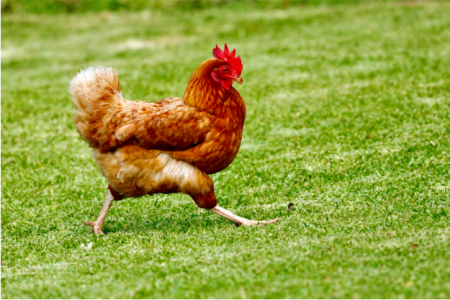New study uncovers disturbing link between a household favorite and rising cancer cases
- Replies 0
New studies reveal a surprising danger hiding in everyday foods. What you don't know about one popular protein could change how you eat forever.
Recent research has uncovered troubling evidence connecting a common food to rising cancer rates.
While many view it as a healthier alternative to red meat, alarming new data suggests it may not be as safe as once thought.
Let’s break down the shocking new findings and what they could mean for your future health.
A groundbreaking study has spotlighted campylobacter jejuni, a common bacterium found in raw chicken, as a potential player in the progression of colon cancer.
Typically blamed for food poisoning, campylobacter may do more than cause stomach trouble.
Emerging evidence suggests it can cause DNA damage, potentially accelerating cancer growth within the body.
Campylobacter is already infamous—it’s the leading cause of foodborne illness in many countries.

While most recover after a bout of infection, for vulnerable groups—young children, the elderly, and the immunocompromised—the consequences can be far more severe.
Now, with links to cancer progression, the stakes are even higher.
Adding fuel to the fire, Italian researchers have found that eating over 300g of poultry per week—about four servings—could double the risk of dying from digestive system cancers, including colon and stomach cancer.
Tracking thousands of participants over nearly two decades, the researchers theorize that high-temperature cooking of chicken might produce dangerous chemicals.
Also read: Could this common prescription drug offer unexpected cancer protection?
Others point to the use of hormones, medications, or poultry feed practices that could play a role in raising cancer risk.
Closer to home, U.S. researchers studied over 70 colon cancer patients and found higher levels of campylobacter jejuni in those whose cancer had metastasized.
Professor Christian Jobin, co-author of the study, emphasized that a toxin produced by the bacteria, known as cytolethal distending toxin (CDT), appears to be key in accelerating the spread of tumors.
Even more disturbing is the demographic shift: colon cancer is no longer just an older adult's disease. Diagnoses are rising sharply among individuals in their 20s, 30s, and 40s, sparking urgent investigation into potential environmental and dietary triggers.
In the UK, campylobacter contamination is monitored closely. Supermarkets must regularly report the percentage of chickens highly contaminated with the bacterium.
The Food Standards Agency (FSA) estimates that campylobacter costs the UK economy nearly £900 million annually in healthcare costs and lost productivity—a figure highlighting the bacteria's profound economic and health impacts.
To reduce your risk, the FSA recommends:
Also read: Game-changing cancer breakthrough—is this the cure we've been waiting for?
Campylobacter isn't alone under scrutiny. Other bacterial culprits have also been linked to cancer risk:
Read next: This drink linked to cancer—experts urge caution!

These revelations might leave you rethinking your next grocery run. Have you changed how you prepare or source your chicken? Are you exploring new, safer protein options? Share your experiences, ideas, and questions in the comments below—we’re in this together.
Recent research has uncovered troubling evidence connecting a common food to rising cancer rates.
While many view it as a healthier alternative to red meat, alarming new data suggests it may not be as safe as once thought.
Let’s break down the shocking new findings and what they could mean for your future health.
A groundbreaking study has spotlighted campylobacter jejuni, a common bacterium found in raw chicken, as a potential player in the progression of colon cancer.
Typically blamed for food poisoning, campylobacter may do more than cause stomach trouble.
Emerging evidence suggests it can cause DNA damage, potentially accelerating cancer growth within the body.
Campylobacter is already infamous—it’s the leading cause of foodborne illness in many countries.

Recent research has uncovered troubling evidence connecting a common food to rising cancer rates. Image source: James Wainscoat / Unsplash
While most recover after a bout of infection, for vulnerable groups—young children, the elderly, and the immunocompromised—the consequences can be far more severe.
Now, with links to cancer progression, the stakes are even higher.
Adding fuel to the fire, Italian researchers have found that eating over 300g of poultry per week—about four servings—could double the risk of dying from digestive system cancers, including colon and stomach cancer.
Tracking thousands of participants over nearly two decades, the researchers theorize that high-temperature cooking of chicken might produce dangerous chemicals.
Also read: Could this common prescription drug offer unexpected cancer protection?
Others point to the use of hormones, medications, or poultry feed practices that could play a role in raising cancer risk.
Closer to home, U.S. researchers studied over 70 colon cancer patients and found higher levels of campylobacter jejuni in those whose cancer had metastasized.
Professor Christian Jobin, co-author of the study, emphasized that a toxin produced by the bacteria, known as cytolethal distending toxin (CDT), appears to be key in accelerating the spread of tumors.
Even more disturbing is the demographic shift: colon cancer is no longer just an older adult's disease. Diagnoses are rising sharply among individuals in their 20s, 30s, and 40s, sparking urgent investigation into potential environmental and dietary triggers.
In the UK, campylobacter contamination is monitored closely. Supermarkets must regularly report the percentage of chickens highly contaminated with the bacterium.
The Food Standards Agency (FSA) estimates that campylobacter costs the UK economy nearly £900 million annually in healthcare costs and lost productivity—a figure highlighting the bacteria's profound economic and health impacts.
To reduce your risk, the FSA recommends:
- Always cook chicken thoroughly until juices run clear.
- Separate raw meat from other foods to avoid cross-contamination.
- Refrigerate promptly and wash hands and surfaces after handling raw chicken.
- Never wash raw chicken, as it can spread harmful bacteria around the kitchen.
Also read: Game-changing cancer breakthrough—is this the cure we've been waiting for?
Campylobacter isn't alone under scrutiny. Other bacterial culprits have also been linked to cancer risk:
- Helicobacter pylori has been implicated in stomach and colon cancer.
- Fusobacterium nucleatum is increasingly associated with colorectal cancer.
- Certain strains of E. coli, particularly those found in contaminated leafy greens, have seen infection rates spike almost tenfold in England over the last seven years.
Read next: This drink linked to cancer—experts urge caution!
Key Takeaways
- Studies suggest that campylobacter jejuni, commonly found in chicken, may contribute to DNA damage that accelerates colon cancer.
- Eating more than 300g of poultry per week could double the risk of death from digestive system cancers, according to Italian researchers.
- Food safety measures, including proper cooking and handling of poultry, are vital to minimizing infection risks.
- Other bacteria, including helicobacter pylori and certain E. coli strains, are also linked to rising colon cancer rates.






